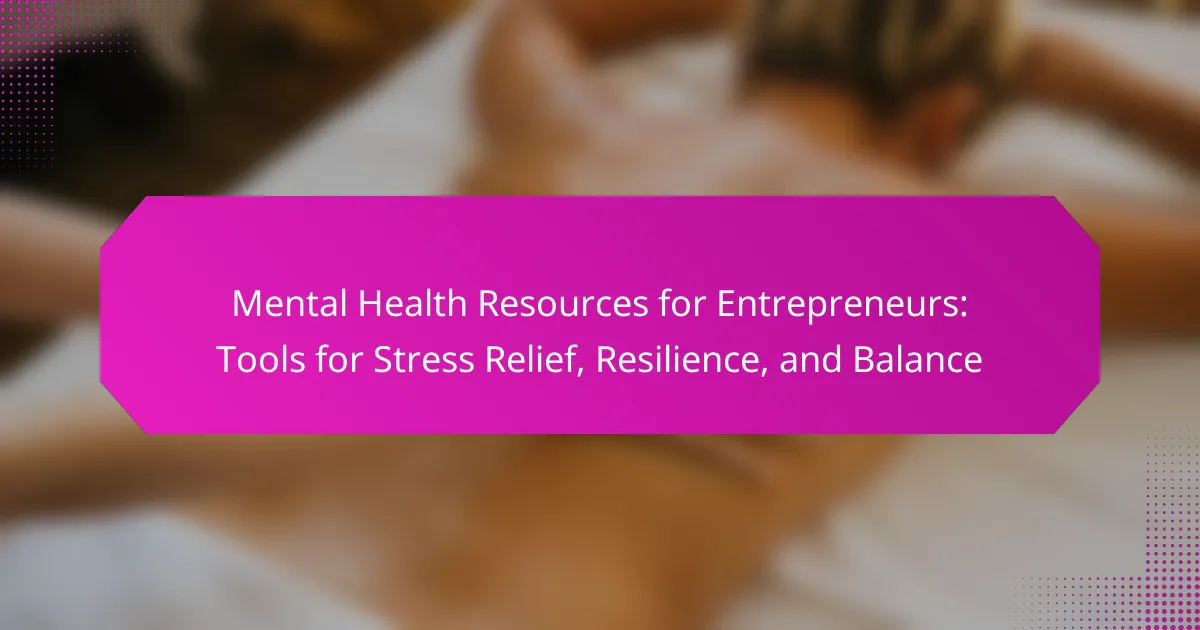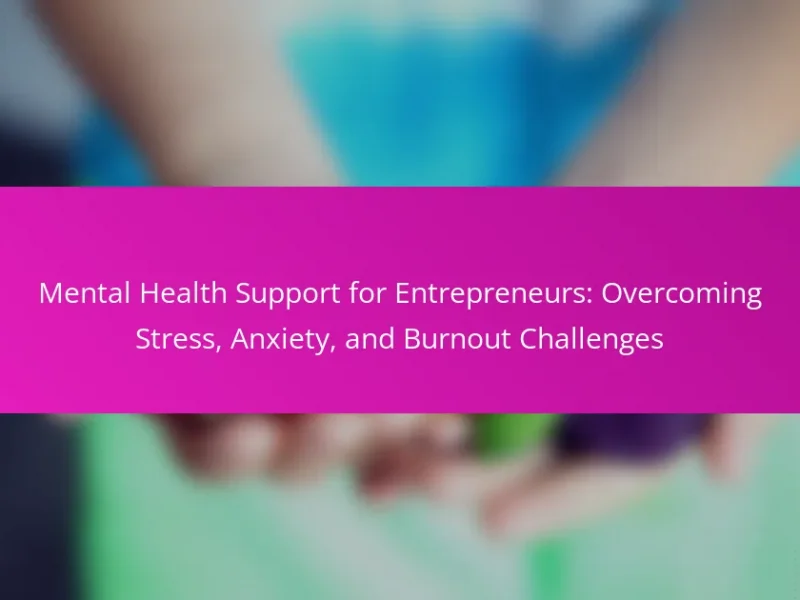Entrepreneurs often face high stress, isolation, and uncertainty, leading to mental health challenges. This article explores mental health resources for effective stress relief, including mindfulness practices, professional therapy, and peer support networks. It highlights the importance of physical exercise and time management tools in fostering resilience and balance. By prioritising mental well-being, entrepreneurs can enhance their productivity and satisfaction.
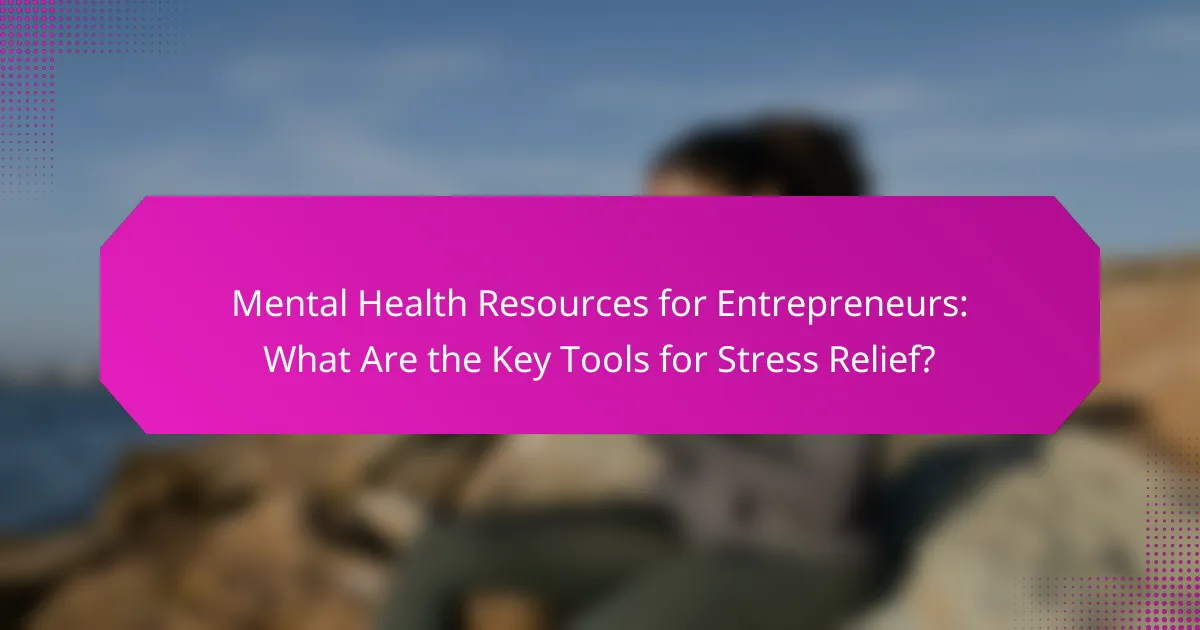
Mental Health Resources for Entrepreneurs: What Are the Key Tools for Stress Relief?
Entrepreneurs can utilise various mental health resources for effective stress relief. Key tools include mindfulness practices, physical exercise, professional therapy, and peer support networks.
Mindfulness practices, such as meditation and deep-breathing exercises, enhance resilience by promoting relaxation and focus. Research indicates that even short daily sessions can significantly reduce stress levels.
Physical exercise is vital for mental well-being. Engaging in regular aerobic activities releases endorphins, which improve mood and decrease anxiety. Aim for at least 150 minutes of moderate exercise weekly for optimal benefits.
Professional therapy provides tailored support for entrepreneurs facing unique challenges. Cognitive-behavioural therapy (CBT) is particularly effective in addressing stress and anxiety.
Peer support networks, such as entrepreneur groups or forums, foster connection and shared experiences. Engaging with others facing similar challenges can alleviate feelings of isolation and provide valuable insights.
How Can Mindfulness Practices Benefit Entrepreneurs?
Mindfulness practices can significantly benefit entrepreneurs by enhancing stress relief, resilience, and overall balance. These techniques promote mental clarity, reduce anxiety, and improve focus, which are crucial for navigating the challenges of entrepreneurship. Regular mindfulness can lead to better decision-making and increased emotional intelligence, fostering a healthier work environment. Research indicates that mindfulness can reduce burnout rates among entrepreneurs, enabling sustained productivity and creativity.
What Role Does Physical Exercise Play in Managing Stress?
Physical exercise significantly reduces stress levels by promoting the release of endorphins, which enhance mood and overall well-being. Regular physical activity also improves sleep quality, increases resilience, and fosters a sense of achievement. According to a study, 30 minutes of moderate exercise can lower anxiety and improve mental clarity. Additionally, engaging in group activities can build social connections, further alleviating stress. Entrepreneurs can integrate exercise into their routines to maintain mental health and achieve a balanced lifestyle.
How Can Time Management Techniques Improve Mental Well-being?
Time management techniques enhance mental well-being by reducing stress and improving focus. Effective planning allows entrepreneurs to prioritise tasks, which leads to a sense of control and accomplishment. Techniques like the Pomodoro Technique and time blocking help maintain work-life balance, fostering resilience against burnout. Studies show that structured time management can increase productivity by up to 25%, directly benefiting mental health. Implementing these strategies creates a supportive environment for emotional stability and better decision-making.
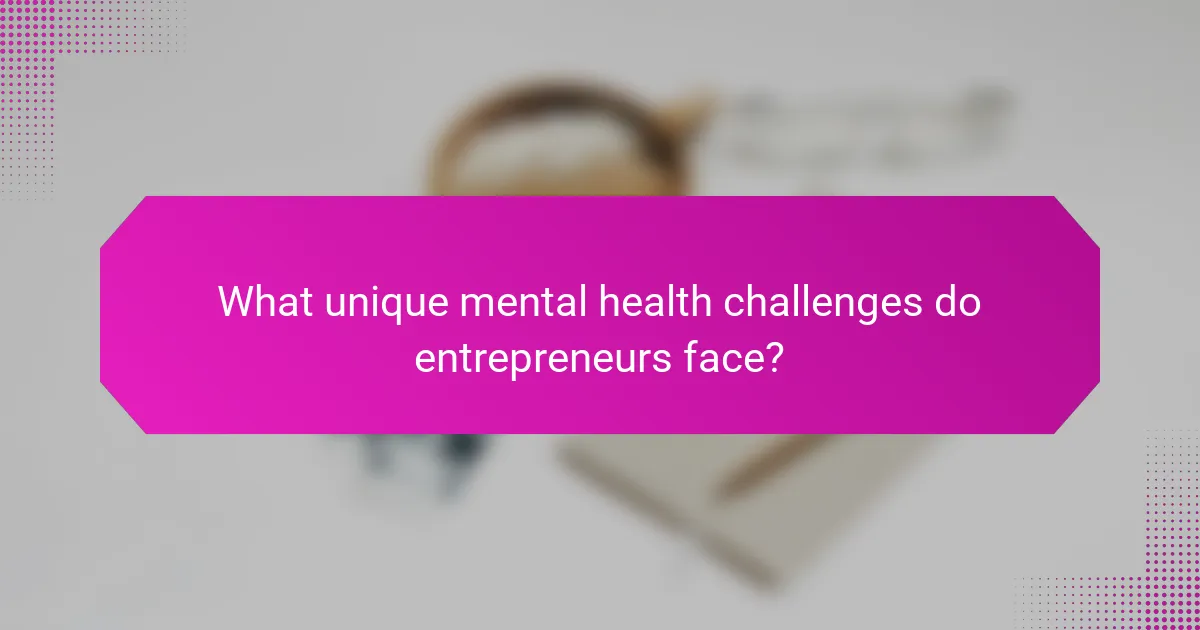
What Unique Mental Health Challenges Do Entrepreneurs Face?
Entrepreneurs face unique mental health challenges due to high stress, isolation, and uncertainty. These factors can lead to anxiety, depression, and burnout. Accessing mental health resources tailored for entrepreneurs can enhance resilience and promote balance. Tools such as mindfulness practices, peer support networks, and professional counselling are essential for managing these challenges. Studies show that 72% of entrepreneurs experience mental health issues, highlighting the need for targeted support. Prioritising mental well-being is crucial for sustained entrepreneurial success.
How Does Isolation Impact Entrepreneurial Mental Health?
Isolation negatively affects entrepreneurial mental health by increasing stress and anxiety levels. Entrepreneurs often face unique pressures, and isolation can exacerbate feelings of loneliness, leading to burnout. Accessing mental health resources is crucial for developing resilience and maintaining balance. Studies show that entrepreneurs who engage in support networks experience lower stress levels and improved well-being. Implementing regular self-care practices and seeking professional help can mitigate the adverse effects of isolation.
What Are the Effects of Financial Pressure on Mental Well-being?
Financial pressure negatively impacts mental well-being by increasing stress, anxiety, and feelings of inadequacy. Entrepreneurs often face unique challenges, leading to heightened emotional distress. Research indicates that financial stress can diminish overall life satisfaction and increase the risk of mental health disorders. Effective mental health resources, such as stress relief techniques and resilience-building tools, are essential for managing these pressures. Establishing a balanced approach to finances and mental health can significantly improve an entrepreneur’s quality of life.
How Can the Fear of Failure Affect Entrepreneurs?
The fear of failure can significantly hinder entrepreneurs by causing anxiety and self-doubt. This emotional burden may lead to decision paralysis, preventing them from taking necessary risks. Mental health resources, such as stress relief techniques and resilience training, can help mitigate these effects. For instance, mindfulness practices can enhance emotional regulation, fostering a healthier mindset. Entrepreneurs who utilise these tools often report improved balance and productivity, allowing them to navigate challenges more effectively.

What Rare Mental Health Resources Are Available for Entrepreneurs?
Entrepreneurs can access rare mental health resources like peer support networks, specialised therapy programmes, and mindfulness retreats. These resources focus on unique challenges faced by entrepreneurs, such as burnout and isolation. Peer support networks, for instance, provide a platform for sharing experiences and strategies. Specialised therapy programmes often tailor approaches to address entrepreneurial stress. Mindfulness retreats offer immersive experiences that promote resilience and balance. These resources are not widely advertised but can significantly enhance mental well-being for entrepreneurs.
What Are the Benefits of Business Coaching for Mental Resilience?
Business coaching enhances mental resilience by providing tailored strategies, accountability, and support. It helps entrepreneurs manage stress, develop coping mechanisms, and maintain balance. Research shows that 70% of individuals who receive coaching report improved mental health and resilience. This unique attribute of personalised guidance fosters a proactive mindset, enabling entrepreneurs to navigate challenges effectively. As a result, business coaching becomes a vital mental health resource for entrepreneurs seeking sustainable success.
How Can Peer Support Networks Enhance Emotional Well-being?
Peer support networks significantly enhance emotional well-being by providing a sense of community and shared understanding. These networks offer emotional validation, reducing feelings of isolation and stress among entrepreneurs. Studies show that individuals in peer support groups experience increased resilience and improved coping strategies, leading to better overall mental health. Such connections foster accountability and motivation, essential for maintaining balance in high-pressure environments.
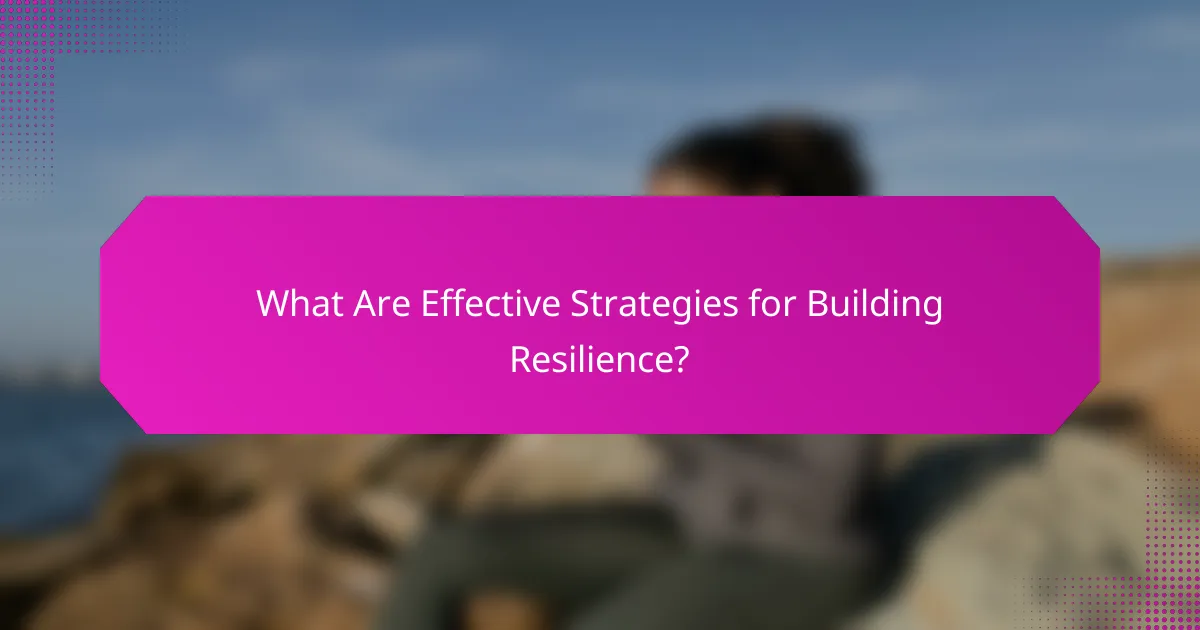
What Are Effective Strategies for Building Resilience?
Effective strategies for building resilience include practising mindfulness, developing strong social connections, and setting realistic goals. Mindfulness helps manage stress and increases emotional awareness. Strong social connections provide support during challenges. Setting realistic goals fosters a sense of accomplishment and motivation. Incorporating these strategies can significantly enhance mental health for entrepreneurs, leading to improved stress relief and overall balance.
How Can Entrepreneurs Develop a Growth Mindset?
Entrepreneurs can develop a growth mindset by embracing challenges, learning from feedback, and fostering resilience. Engaging with mental health resources enhances stress relief and promotes balance. Techniques such as mindfulness practices, coaching, and peer support can significantly contribute to this mindset shift. Regularly reflecting on experiences also cultivates adaptability and continuous improvement.
What Techniques Help in Cultivating Emotional Intelligence?
Practising mindfulness, engaging in active listening, and seeking feedback are key techniques for cultivating emotional intelligence. These methods enhance self-awareness and interpersonal skills essential for mental health in entrepreneurship. Mindfulness promotes emotional regulation, while active listening fosters empathy. Seeking feedback encourages growth and reflection, vital for resilience and balance.
How to Practice Self-Reflection for Personal Growth?
Self-reflection enhances personal growth by fostering self-awareness and emotional intelligence. Entrepreneurs can practise self-reflection through structured journaling, meditation, and feedback sessions. Regularly setting aside time for introspection allows for identifying strengths and weaknesses. Utilising mental health resources, such as guided reflection tools, can promote resilience and balance. Engaging with a mentor or coach can provide unique perspectives that deepen the self-reflection process.
What Are the Best Practices for Work-Life Balance?
To achieve work-life balance, entrepreneurs should prioritise mental health by integrating stress relief techniques into their routines. Effective practices include setting clear boundaries between work and personal time, utilising mindfulness exercises, and engaging in regular physical activity. Additionally, leveraging mental health resources such as counselling or support groups can enhance resilience. These strategies collectively foster a healthier mindset, ultimately leading to improved productivity and well-being.

How Can Entrepreneurs Overcome Common Mental Health Challenges?
Entrepreneurs can overcome common mental health challenges by utilising specific resources and strategies. Effective tools include mindfulness practices, professional therapy, and peer support networks.
Mindfulness practices, such as meditation and yoga, enhance resilience and reduce stress. Research shows these techniques can lower anxiety levels by up to 30%. Professional therapy offers personalised coping strategies, while peer support networks provide shared experiences and encouragement.
Additionally, time management tools help maintain work-life balance, reducing burnout risks. Regular exercise and adequate sleep are crucial for mental well-being, with studies indicating that physical activity can improve mood and cognitive function.
Incorporating these resources fosters a healthier mindset, enabling entrepreneurs to navigate challenges effectively.
What Steps Can Be Taken to Address Burnout?
To address burnout, entrepreneurs can implement several effective strategies. Prioritise self-care by establishing regular breaks and maintaining a balanced lifestyle. Utilise mental health resources, such as counselling or support groups, to gain insights and coping mechanisms. Set realistic goals to avoid overwhelming workloads, and practise mindfulness techniques like meditation to enhance resilience. Lastly, foster a supportive network to share experiences and seek encouragement.
What Are the Signs of Burnout to Watch For?
Burnout signs include chronic fatigue, irritability, lack of motivation, and reduced performance. Entrepreneurs should recognise these symptoms early to seek mental health resources. Addressing burnout can enhance resilience and improve work-life balance. Regular self-assessment and utilising stress relief tools can mitigate these signs effectively.
How to Create a Recovery Plan from Burnout?
To create a recovery plan from burnout, prioritise self-care and set realistic goals. Start by assessing your current mental health status and identify stressors. Incorporate regular breaks, mindfulness practices, and physical activity into your routine. Seek support from peers or mental health professionals to enhance resilience. Establish boundaries to maintain work-life balance, ensuring time for personal interests and relaxation.
What Resources Are Available for Managing Anxiety and Depression?
Mental health resources for managing anxiety and depression include therapy, support groups, and digital tools. Therapy provides personalised coping strategies, while support groups offer shared experiences and community. Digital tools, like apps, enhance accessibility to mindfulness exercises and mood tracking. Each resource contributes to resilience and balance for entrepreneurs facing stress.
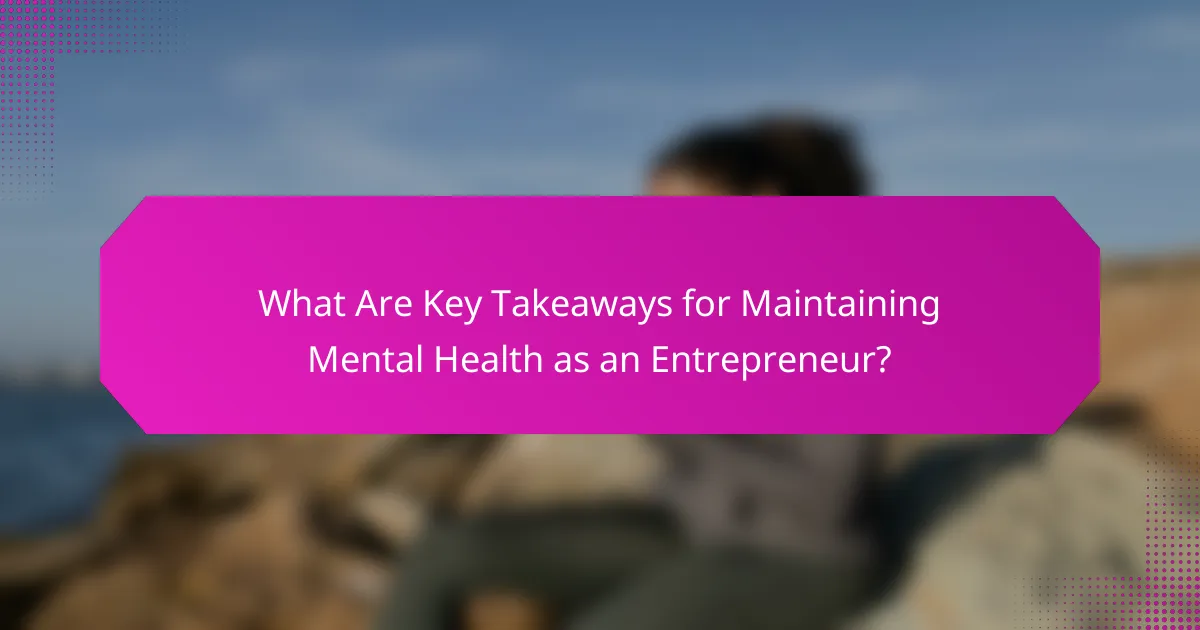
What Are Key Takeaways for Maintaining Mental Health as an Entrepreneur?
To maintain mental health as an entrepreneur, prioritise self-care, establish boundaries, and seek support. Utilise tools like mindfulness practices, time management strategies, and professional counselling. Regular physical activity and social connections also enhance resilience and balance. Research indicates that entrepreneurs who manage stress effectively report higher satisfaction and productivity.
What Daily Habits Can Entrepreneurs Adopt for Better Mental Health?
Entrepreneurs can adopt daily habits like mindfulness, exercise, and structured breaks to enhance mental health. Mindfulness practices, such as meditation, improve focus and reduce stress. Regular physical activity boosts mood and energy levels. Structured breaks prevent burnout and enhance productivity. These habits create resilience and balance in the demanding entrepreneurial lifestyle.
How to Seek Professional Help When Needed?
Seek professional help by identifying mental health resources tailored for entrepreneurs. Start with local therapists specialising in stress management. Utilise online platforms like BetterHelp or Talkspace for convenient access. Join entrepreneur support groups to share experiences and gain insights. Explore workshops focused on resilience and balance. Prioritise mental well-being by scheduling regular check-ins with professionals.
What Common Mistakes Should Entrepreneurs Avoid in Mental Health Management?
Entrepreneurs should avoid neglecting self-care, failing to set boundaries, and ignoring professional help. These mistakes can lead to burnout and decreased productivity. Prioritising mental health is essential for resilience and balance. Establishing a routine that includes stress relief practices, such as mindfulness and exercise, can enhance overall well-being. Seeking support from mental health resources fosters a healthier work environment and promotes long-term success.
What Final Tips Can Enhance Overall Well-being and Resilience?
To enhance overall well-being and resilience, entrepreneurs should prioritise self-care, establish boundaries, and seek support. Regular exercise, mindfulness practices, and adequate sleep significantly contribute to mental health. Engaging in community and professional networks fosters connections that bolster resilience. Utilising mental health resources, such as therapy and stress management tools, can provide valuable coping strategies.
